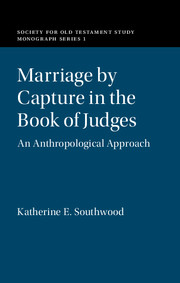Book contents
- Frontmatter
- Contents
- Preface
- 1 Methods, Considerations and Recent Approaches to Judges 21
- 2 Contextualised Outline of the Causes for and Consequences of Marriage by Capture
- 3 Virginity, Marriage and Rape in the Hebrew Bible
- 4 Judges 21 as an Example of Marriage by Capture in the Hebrew Bible
- 5 Marriage by Capture within an Ethnic Narrative: Judges 21 as a Social Critique of Superficial Unity in the Persian Period
- Conclusion
- Bibliography
- Author Index
- Thematic Index
Conclusion
Published online by Cambridge University Press: 30 March 2017
- Frontmatter
- Contents
- Preface
- 1 Methods, Considerations and Recent Approaches to Judges 21
- 2 Contextualised Outline of the Causes for and Consequences of Marriage by Capture
- 3 Virginity, Marriage and Rape in the Hebrew Bible
- 4 Judges 21 as an Example of Marriage by Capture in the Hebrew Bible
- 5 Marriage by Capture within an Ethnic Narrative: Judges 21 as a Social Critique of Superficial Unity in the Persian Period
- Conclusion
- Bibliography
- Author Index
- Thematic Index
Summary
Judges 19–20 functions as a narrative of ethnic division wherein the Benjamites are depicted as the ethnic Other in contrast with Israel. However, in Judges 21 the issue of Israelite unity and ethnic identity is brought into bold relief. Like the people of the land in Ezra, the Benjamites have a claim to participate within Israel. In both texts, an internal group is treated as a foreigner whom Israel is not to participate in marriages with. Judges 21 provides postexilic readers with two episodes of marriage by capture in order to illustrate how the Benjamites, a foil for the people of the land during the postexilic period, assert their ethnic identities through marriage, particularly through marriage by capture. It functions as a warning against compromising by submitting to superficial unity through intermarriage or through recognition of the similarities between the two groups (Israel, or the returnees and Benjamin or the people of the land). Any such unity would result in the consequence that the character, culture, and values of the ethnic group “Israel” would be drastically changed. Upon reading or hearing such a narrative, postexilic readers or audiences are encouraged to construct socially those who are categorised as “Benjamites” as foreigners who do not belong within the group and any doubts about the merits of unity are silenced.
We began by exploring marriage by capture. This category was coined by the pioneering research of McLenan and for this reason was used throughout the book, despite its imperfections. Through focusing on marriage by capture, key issues such as endogamy, virginity, kinship or relatedness, and ethnic identity which arise within the Judges were put in bold relief. Most significantly, we were able to grasp how particular aspects of the sociostructural system may have given rise to practices such as marriage by capture, and to grasp the complexity of the practice itself. Marriage by capture, far from being another means of expressing rape, is a wide-ranging yet multifaceted phenomenon. There is a spectrum of examples of the practice, ranging from ceremonial mock capture to raiding for wives. Some captures are prearranged with the agreement of parents, others are not; some target individuals, others groups; and various interpretations of the practice occur at an emic level.
- Type
- Chapter
- Information
- Marriage by Capture in the Book of JudgesAn Anthropological Approach, pp. 232 - 238Publisher: Cambridge University PressPrint publication year: 2017

